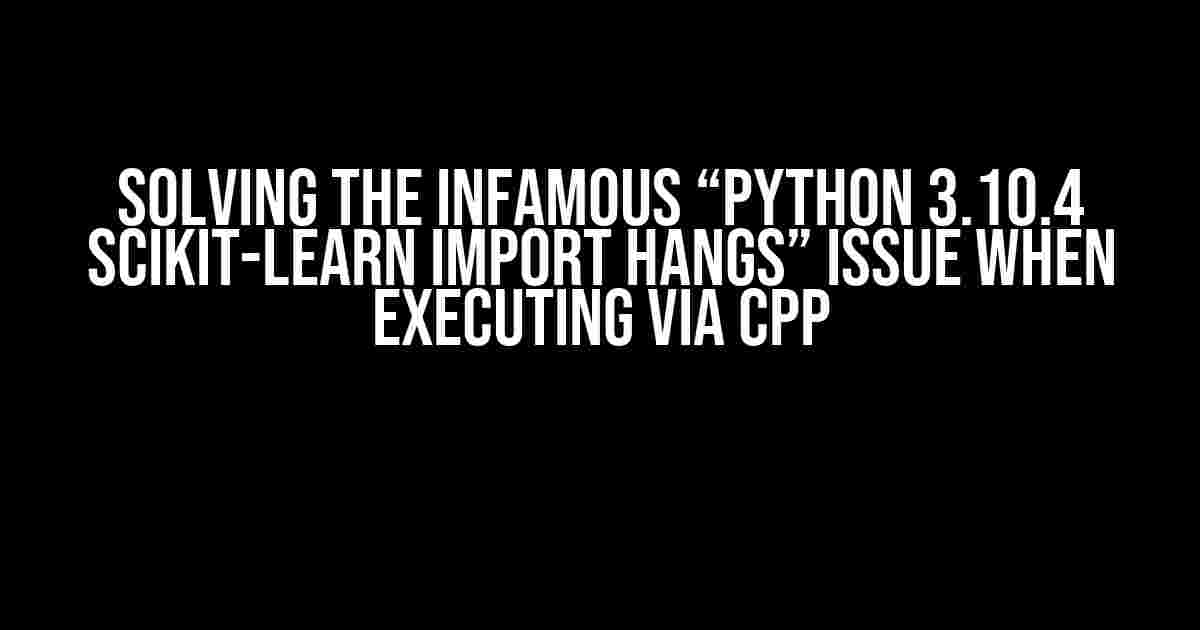If you’re reading this, chances are you’ve stumbled upon one of the most frustrating errors in the Python-CPP intersection: the infamous “Python 3.10.4 scikit-learn import hangs” issue. Fear not, dear reader, for we’re about to dive into the depths of this problem and emerge victorious on the other side!
The Mystery of the Hanging Import
The issue typically manifests when attempting to import scikit-learn from within a C++ application using Python 3.10.4 as the interpreter. The program will hang indefinitely, leaving you wondering if you’ve stumbled upon a bug or if the Python gods are playing a cruel joke on you.
Theories and Speculations
Before we dive into the solution, let’s explore some theories behind this phenomenon:
- Thread Safety: Python’s Global Interpreter Lock (GIL) and C++’s thread management might be at odds, causing the hang.
- Library Conflicts: scikit-learn’s dependencies, such as OpenBLAS, might be conflicting with C++ libraries, leading to the import hang.
- Interpreter Initialization: The way Python 3.10.4 initializes its internal state might be causing the issue when executed from within a C++ application.
The Solution: A Step-by-Step Guide
Now that we’ve explored the possible causes, let’s get to the solution! Follow these steps carefully to resolve the “Python 3.10.4 scikit-learn import hangs” issue:
Step 1: Ensure You Have the Correct Python Version
Verify that you’re using Python 3.10.4 (or above) as your interpreter. You can check by running the following command in your terminal:
python --versionStep 2: Install scikit-learn and Dependencies
Make sure scikit-learn and its dependencies are installed correctly using pip:
pip install scikit-learnStep 3: Compile and Link Against the Correct Python Library
In your C++ application, ensure you’re linking against the correct Python library. For Python 3.10.4, this would be:
libpython3.10.soIf you’re using a package manager like CMake, update your CMakeLists.txt to include the correct library:
find_package(Python3 3.10 REQUIRED)
link_directories(${Python3_LIBRARIES})Step 4: Initialize the Python Interpreter Correctly
In your C++ code, initialize the Python interpreter using the following code:
#include
int main() {
Py_Initialize();
// Your Python-CPP code here
Py_Finalize();
return 0;
} Step 5: Import scikit-learn and Verify
Finally, import scikit-learn within your C++ application and verify that it doesn’t hang:
#include
int main() {
Py_Initialize();
PyObject *module = PyImport_ImportModule("sklearn");
if (module == NULL) {
PyErr_Print();
exit(1);
}
Py_DECREF(module);
Py_Finalize();
return 0;
} Troubleshooting and Additional Tips
If you’re still experiencing issues, consider the following:
Verify OpenBLAS Installation
Ensure OpenBLAS is installed correctly and configured to work with scikit-learn. You can check by running:
import numpy as np
np.show_config()This should display OpenBLAS as one of the libraries used by NumPy.
Check for Library Conflicts
If you’re using other libraries that might conflict with scikit-learn, try isolating the issue by removing or updating those libraries.
Debug and Profile Your Application
Use Python’s built-in debugging and profiling tools, such as pdb and cProfile, to identify performance bottlenecks and potential issues:
import pdb
pdb.run('import sklearn')This will allow you to step through the import process and identify any potential hang-ups.
Conclusion
With these steps and tips, you should now be able to successfully import scikit-learn within your C++ application using Python 3.10.4 as the interpreter. Remember to stay vigilant and troubleshoot any issues that may arise.
The “Python 3.10.4 scikit-learn import hangs” issue might seem daunting, but by following this guide, you’ll be well on your way to harnessing the power of scikit-learn within your C++ applications.
Additional Resources
For further reading and exploration:
Now, go forth and conquer the world of Python-CPP integration!
Frequently Asked Question
Stuck with Python 3.10.4 scikit-learn import hanging when executing via CPP? Don’t worry, we’ve got you covered!
Q1: Why does Python 3.10.4 scikit-learn import hang when executing via CPP?
One possible reason is that there might be a conflict between the Python version and the scikit-learn library. Try updating scikit-learn to the latest version or using a virtual environment to isolate the packages.
Q2: Is it a problem with the CPP code or the Python environment?
It’s likely a problem with the Python environment. Check if you’re using the correct Python version and if scikit-learn is installed correctly. Also, try running the Python script directly to see if the issue persists.
Q3: Can I use an older version of scikit-learn or Python to avoid the hanging issue?
Yes, you can try downgrading scikit-learn or Python to a version where the issue doesn’t occur. However, be aware that this might not be the best solution, as you might miss out on new features and bug fixes. It’s recommended to investigate the root cause of the issue instead.
Q4: How can I debug the issue to find the root cause?
You can try enabling debug logging in Python, using tools like pdb or faulthandler, or running the script with the `PYTHONVERBOSE` environment variable set to `1`. This can help you identify where the issue occurs and what might be causing the hang.
Q5: Are there any known issues or bug reports related to this problem?
Yes, there might be existing bug reports or issues related to this problem. Check the scikit-learn and Python issue trackers, as well as online forums and communities, to see if others have encountered similar issues and if there are any known workarounds or solutions.





